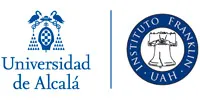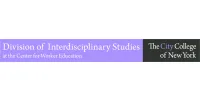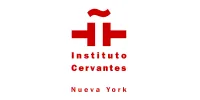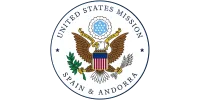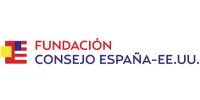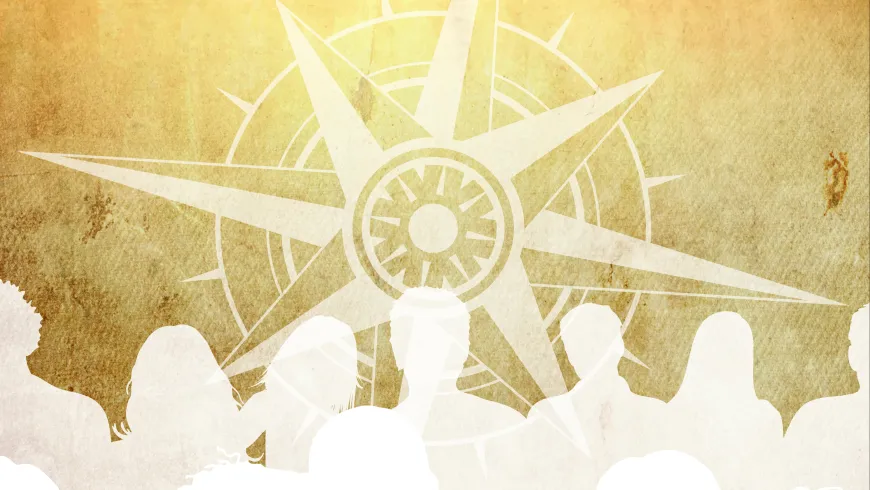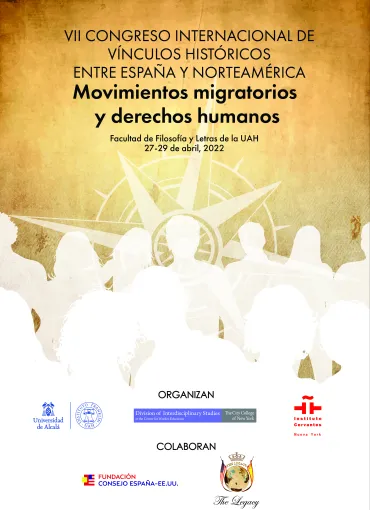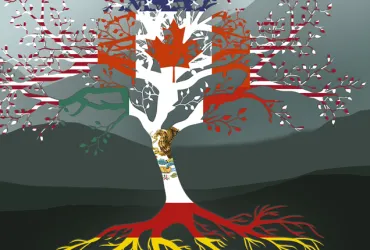7th International Conference on the Historical Links between Spain and North America
Migratory movements and human rights
In a globalizing world, migration is key to understanding the formation, evolution, and present realities of many countries. Such population movements—whether unidirectional or circular, short or long term—condition the political, social, economic, and cultural structures of both countries of origin and destination. Since the 15th century, many have crossed the Atlantic corridor between Spain and North America, while vertical movements between North and South have occurred for millennia. Today the world is experiencing the highest levels of forced displacement since World War II. Whether in historical perspective or contemporary times, migratory movements—whether regular or irregular, for better opportunity or for survival, voluntary or forced—pose serious human rights challenges for those on the move, resettling, or returning, and for families and communities left behind as well as recipient populations.
The 7th International Conference on the Historical Links between Spain and North America will focus on transatlantic and Pan-American migration. It will examine the human rights challenges stemming from migration, both past and present. It will explore migration policies, relations between countries, and international legal regimes that provide rights to migrants and the extent to which they are or are not effective at providing protection.
The Instituto Franklin of the Universidad de Alcalá, the City College of New York’s Division of Interdisciplinary Studies, and the Instituto Cervantes of New York join for the seventh time in organizing this conference with an emphasis on interdisciplinary approaches to examining the historical links between Spain and North America.
The following topics will be prioritized:
- Migrations and migratory movements
- Immigration and human rights
- International relations
- Frontier studies
- Immigration policy and security
- Science and technology: Climate change, advances on COVID-19, 5G technology, among others
For further information, please check the Call for Papers available in English language below:
- Deadline for proposals submission: January 17th, 2022
- Acceptance of proposals: January 25th, 2022
- Publication of the provisional program: February 1st, 2022
- Period for reduced-price registration: From February 1st to February 22nd, 2022
- Period for ordinary-price registration: From February 23rd to March 22nd, 2022
- Publication of the final program: April 5th, 2022
- Richard Bueno Hudson (Instituto Cervantes NY)
- Francisco Sáez de Adana Herrero (Instituto Franklin-UAH)
- Julio Cañero (Instituto Franklin-UAH)
- Juan Carlos Mercado (CCNY-CUNY)
- José Antonio Gurpegui (Instituto Franklin-UAH)
- Miguel Ángel de Zavala (Instituto Franklin-UAH)
- Montserrat Huguet Santos (Universidad Carlos III)
- Lorenzo Delgado Gómez-Escalonilla (CSIC)
- Carmen de la Guardia Herrero (Universidad Autónoma de Madrid)
- Francisco Castilla Urbano (UAH)
- Ignacio Uría Rodríguez (UAH)
- Carlos Aguasaco (CCNY-CUNY)
- Delia Antelo (Instituto Cervantes NY)
- Esperanza Cerdá (Instituto Franklin-UAH)
- Cristina Crespo (Instituto Franklin-UAH)
- Carlos Herrero (Instituto Franklin-UAH)
- Ana Lariño (Instituto Franklin-UAH)
- Anna Marta Marini (Instituto Franklin-UAH)
- Ana Serra (Instituto Franklin-UAH)
Inocencio "Chencho" Arias is a Spanish diplomat, retired in 2010. He has held relevant positions such as Secretary of State for Cooperation (vice minister), undersecretary of Foreign Affairs, ambassador of Spain to the United Nations (from July 1997 to December 2004) and spokesman for the Ministry of Foreign Affairs with three different governments of democracy (UCD, PSOE, and PP). He actively collaborates with media such as El Mundo, "Cadena COPE", and El Periódico. He has also published books about his diplomatic life and current affairs, including Confesiones de un diplomático, Los presidentes y la diplomacia, or Yo siempre creí que los diplomáticos eran unos mamones.
Dr. Castresana has been a practicing attorney, magistrate, investigating judge and public prosecutor for more than 30 years.
In 1989 he became a member of the Career of Public Prosecutors of Spain. Since that time, he has worked in the Prosecution Offices of Barcelona and Madrid, as well as in the Anti-drug and Anti-corruption Special Prosecution Offices. In 2005 he was promoted to the Supreme Court of Spain.
In 2007, the UN Secretary General appointed Dr. Castresana as Commissioner against Impunity in Guatemala, with the category of Assistant Secretary General of the UN. Dr. Castresana worked in this post until 2010. In recognition of his work in Guatemala Dr. Castresana received the Medal of Honor as Commendatore della Repubblica from Italy, the Grand Cross badge of Honor from Guatemala, the title of Officer of the Legion of Honor from France, and the Order of the Civil Merit from Spain. Dr. Castresana is also a recipient of the National Award for Human Rights in Spain and holds the title of Doctor Honoris Causa from the University of Guadalajara, Mexico, and Central University of Chile.
Dr. Castresana has been an expert on a number of legal missions including with the Council of Europe, the EU, the UN and the World Bank, amongst others. He has written multiple articles published in media and specialised legal magazines, and lectured in universities and other institutions in Europe and America (including Harvard, Yale, NYU, CUNY, Drexel, Berkeley, Stanford, the US DoD and DoS). He is also a Professor of Criminal Law at Carlos III University of Madrid, and International Criminal Law at the University of San Francisco, California, and Haverford College, Pennsylvania.
In 2016 he was awarded the First Prize for Transparency, Integrity and Fighting Corruption by the General Counsel of Lawyers of Spain and Transparency International. Currently, he is the Head of the Department of Criminal Law in Estudio Jurídico Ejaso, a law firm based in Spain and Portugal.
Professor, and Robert H. and Nancy Dedman Chair in History Associate Director, Clements Center for Southwest Studies
Professor Foley's current research centers on the politics of immigration and citizenship in North America and Europe; Nativism/Xenophobia and ethno-nationalist movements globally; changing constructions of race, citizenship, and transnational identity in the U.S.-Mexico borderlands; migration studies; and comparative civil rights politics of African, Asian, and Latinx Americans.
He is co-editor (with James Hollifield) of Understanding Global Migration (forthcoming, Stanford University Press, 2022) and the author of The White Scourge: Mexicans, Blacks, and Poor Whites in Texas Cotton Culture (University of California Press, 1997); Quest for Equality: The Failed Promise of Black-Brown Solidarity (Harvard University Press, 2010), Mexicans in the Making of America (Harvard University Press, 2014); Los Mexicanos en la creación de los Estados Unidos (Instituto Mora, 2020); Teaching Mexican American History (American Historical Association, 2002, co-authored with John R. Chávez); and Reflexiones: New Directions in Mexican American Studies (University of Texas Press, 1998).
Professor Foley is a Distinguished Lecturer of the Organization of American Historians and has lectured extensively in the U.S., Europe and Latin America. For a number of years he lived and taught in Mexico (Mexico City), Germany (Berlin, Heidelberg, Stuttgart), Spain (Salamanca, Zaragoza), and Japan (Misawa; Naha, Okinawa). He also spent two years living on aircraft carriers in the Mediterranean Sea where he taught sailors of the U.S. Navy's 6th Fleet in its Program for Afloat College Education (PACE).
Registration fee includes access to parallel sessions and keynotes, material for the conference, welcome coffees, institutional cocktail, cultural activity, and participation and attendance certificates.
| Registration* | Fee |
|---|---|
| Early-birds registration - speakers (until 22/02/2022) | €100 |
| General registration - speakers (from 23/02/2022 to 22/03/2022) | €140 |
| Student-speakers** - undergraduate and graduate students participating as speakers in the conference | €25 |
| Attendant*** - non-speakers | €0 |
*Collaborating institutions are exempted from paying. If you belong to one the institutions, fulfill the registration form and submit it, but do not continue with the payment
**It is required to upload an enrolment certificate in the "Document" field in the registration form
***Due to seating capacity limitations, attendants are required to fulfill the registration form available on this website. If the registration form is not submitted, the attendance will not be guaranteed, and receiving an attendance certificate will not be possible
